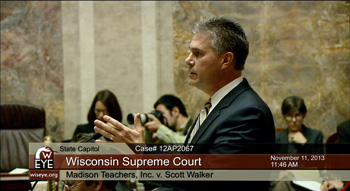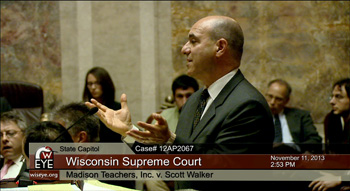
Attorney General J.B. Van Hollen argues the state’s case to uphold Act 10. Photo courtesy of WisconsinEye.

Madison attorney Lester Pines argues that Act 10 unconstitutionally burdens the right of workers to associate. Photo courtesy of WisconsinEye.
Nov. 20, 2013 – Strolling through Madison in early 2011, signs like “Don’t Walker Over My Rights” were everywhere. Teachers and other public employees were protesting Act 10, the bill that curbed the collective bargaining rights of most public workers.
This month, the Wisconsin Supreme Court heard a case that marks a crucial moment in the contentious period that has divided much of Wisconsin: the seven-member court will determine whether Act 10 violates worker rights under the state constitution.
In Madison Teachers Inc. v. Scott Walker, Attorney General J.B. Van Hollen argued the state’s case to uphold Act 10, while Madison attorney Lester Pines told the seven justices that Act 10 unconstitutionally burdens the right of workers to associate.
Paul Secunda, a law professor at Marquette University Law School who teaches labor law, predicts the “conservative bloc” of justices (Gableman, Prosser, Roggensack, and Ziegler) will uphold the law, despite his view that Madison Teachers Inc. has a valid constitutional argument.
“Regardless of whether the union has a valid or conceivable constitutional argument, which I believe it does, Act 10 will be found constitutional by a 4-3 vote,” Secunda said, “I would be shocked if it didn’t come out that way. I don’t think the outcome is in doubt.”
Perspectives from Jay Ranney, Madison Lawyer and Legal Historian
Would You Say this is a Landmark Case?
Act 10 is a landmark law, and the Act 10 case is likely to be a landmark case – but it remains to be seen what Act 10’s true legacy will be. Act 10 has generated a level of controversy and passion among both supporters and opponents that has not been seen in Wisconsin since the 1850s, when the Booth cases and debate over enforcement of the Fugitive Slave Act created a similarly deep divide and a similar era of bad feelings in Wisconsin. I expect that the Wisconsin’s Supreme Court’s decision, whatever it is, will re-kindle those passions.
What might you say about this case if you were writing about it 100 years from now?
We don’t yet know what the long-term consequences of Act 10 will be. If the Wisconsin Supreme Court upholds the law, it is possible that the law will remain in place for many years and will permanently change the balance of power between employers and workers in Wisconsin, both in the public and private sectors. It is also possible that the law will be repealed or modified at the next turn of the political wheel, or that larger social forces – particularly the tech revolution and the shift in America since the 1960s from a communitarian view to a highly individualized view of liberty and self-expression – will change the workplace in ways that will render Act 10’s model of labor relations obsolete. We’ll know better a hundred years from now.
Are there other interesting aspects of Act 10, historically speaking?
One interesting aspect of Act 10 is that it illustrates the importance of state constitution-making. Ohio enacted its own version of Act 10 in 2011, but voters used a procedure in the Ohio state constitution for recall of laws (not governors) to throw out the law later that year. Ohio enacted its “law recall” provision as part of a series of Progressive-inspired constitutional amendments in 1912. Wisconsin’s Progressive-dominated legislatures of 1911 and 1913 enacted a similar amendment, but 1914 was a bad year for Progressives at the polls and the voters defeated it. In the 1920s, another Progressive legislature enacted the lawmaker-recall statute that was used in 2011. So, but for a quirk of constitution-making in the 1910s, Wisconsin might have followed the same path as Ohio.
Of course, Van Hollen and other proponents of Act 10 believe that it should be upheld, because Act 10 simply does not infringe upon constitutionally protected rights.
“It is certainly not a constitutional violation to limit the scope of collective bargaining, since it is not a constitutional violation to eliminate collective bargaining as a whole,” Van Hollen told the Wisconsin Supreme Court justices Nov. 11 at oral argument.
Collective Bargaining in Wisconsin
In Wisconsin, public-sector workers have a statutory right to collectively bargain under the Municipal Employment Relations Act and the State Employee Labor Relations Act. Act 10 (and Act 32, the 2011-13 budget) impacted those collective bargaining rights.
Specifically, the law prohibits employers from bargaining on anything other than base wages, and requires a local referendum if proposed base-wage increases exceed cost-of-living adjustments that are tied to the consumer price index.
Previously, employers could also bargain on hours, working conditions, and non-base wages such as overtime, bonuses, merit increases, or automatic pay progressions.
The law also requires annual certification of bargaining agents by a supermajority, and prevents bargaining agents from collecting costs associated with the indirect representation of non-represented employees who benefit from bargaining activity.
Previously, bargaining agents could negotiate for “fair-share” payments and agents remained the exclusive bargaining agent unless 30 percent of employees called for a recertification election, the costs of which are borne by the unions. Act 10 also prohibits automatic payroll deductions for union dues, which was allowed previously.
Although Act 10 places restrictions on the statutory right to collectively bargain, all parties agreed that there is no constitutional right to collectively bargain. The union’s argument is rooted in the right to associate with a union, which is a constitutional right.
The Wisconsin Constitution grants the right to assemble, to consult for the common good, and petition the government. While the union in Madison Teachers says Act 10 abridges the right of workers to associate, the state says the union’s argument fails because there is no right to associate for purposes of collective bargaining.
Act 10 Litigation and the Arguments
Act 10 has been the subject of much litigation, but this is the first case to reach the Wisconsin Supreme Court. Similar constitutional issues were raised in Wisconsin Law Enforcement Association et al. v. Scott Walker, which involved state (not municipal) employees.
In that case, Dane County Circuit Court Judge John Markson upheld Act 10 after rejecting a request to hold the case pending resolution of Madison Teachers. In dismissing the case, Judge Markson ruled that “Act 10 does not implicate plaintiffs’ association rights,” and the state supreme court is not bound by federal precedent.
Judge Markson’s recent decision conflicts with the ruling of fellow Dane County Circuit Court Judge Juan Colas in Madison Teachers. In 2012, Colas ruled that Act 10 was mostly unconstitutional, setting up an appeals court certification to the supreme court.
What Do You Think?
Will Act 10 be upheld? Post a comment about Madison Teachers Inc. v. Scott Walker below.
The Colas ruling halted Act 10’s enforcement – and he issued a contempt order against the Wisconsin Employment Relations Commission officials who planned to enforce it – but the Wisconsin Supreme Court will now decide if the Colas ruling will live or die.
Federal courts have also weighed in on Act 10. The Seventh Circuit Court of Appeals ruled that Act 10 does not violate the U.S. Constitution.
The federal court upheld the law “in its entirety,” while ruling specifically on provisions that require unions to recertify annually and prohibit automatic payroll deductions to pay union dues. The challengers had said these provisions violate free speech rights.
Before that, a federal district court judge had ruled that Act 10’s payroll deduction prohibition violated free speech because dues money is generally used to fund protected speech by the union. But the appeals court said the law does not stop unions from collecting dues, it merely prohibits the use of state payroll systems to collect them.
Unconstitutional Conditions Argument
In Madison Teachers, the union presents a state constitutional challenge under a different legal argument. Madison Teachers, a union with more than 4,500 members, says Act 10 is unconstitutional under the “doctrine of unconstitutional conditions,” an argument that was not put forth or considered in the federal appeals court case.
Under this doctrine, according to the union’s brief, the government cannot place a condition on the receipt of a benefit that requires the recipient to forfeit a constitutionally protected right, even if the government is not obligated to provide the benefit.
The benefit is collective bargaining. But Act 10 induces workers to abandon association rights by placing such onerous restrictions on collective bargaining, the union says.
 Act 10, which limits bargaining to base wages, places “cumulative burdens” on the right to associate with collective bargaining agents, the union argues, because engaging in that association means represented workers cannot negotiate beyond base wages.
Act 10, which limits bargaining to base wages, places “cumulative burdens” on the right to associate with collective bargaining agents, the union argues, because engaging in that association means represented workers cannot negotiate beyond base wages.
“The state is saying, you can make this associational choice, but if you do, we are going to hit you over the head with a baseball bat,” Pines told the justices at the Nov. 11 oral argument. “The state is saying, if you exercise an associational right, we are going to penalize you for doing so.” Pines says these burdens cross a constitutional line.
Pines noted that Act 10 prevents automatic deductions for union dues, while deductions for other purposes are allowed. In addition, unions and their members bear new operational and economic costs that make union membership a negative, he says.
On the other hand, J.B. Van Hollen argued that “a constitutional right of association only exists if it is for the purposes of advancing some fundamental First Amendment right, which we have all conceded, collective bargaining is not.”
While the primary arguments discussed “associational rights” and whether Act 10’s provisions place unconstitutional burdens on the right to associate, Madison Teachers also made an equal protection argument under the Wisconsin Constitution.
The union says that represented workers are treated different than similarly situated non-represented workers, who are not restricted to negotiating base wages only.
The court will also decide if provisions within Act 10 may prohibit the city of Milwaukee from paying employee contributions to the retirement system, or whether that violates home rule authority giving local governments control of local affairs.
As the Wisconsin Supreme Court weighs its decision, other states will be watching.
Act 10 helped trigger a massive wave of collective bargaining legislation across the country in 2011. A majority of approximately 600 bills sought to curb collective bargaining activity, according to the National Conference of State Legislatures.
